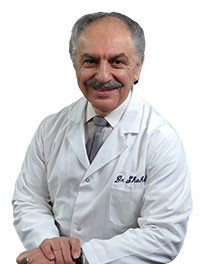Reactive Arthritis Treatment in Midland Park, NJ

Reactive arthritis is an autoimmune disorder causing joint pain and swelling, which is triggered by infection in the body, usually in the intestines, genitals or urinary tract. Reactive arthritis most frequently affects the knees and the joints of your ankles and feet, while a specific form of reactive arthritis known as Reiter's syndrome may cause inflammation affecting your eyes, urethra and joints.
The condition is most common in people who are between the ages of 20 and 40, while a certain genetic marker may also be linked to it. While reactive arthritis in women is just as common as it is in men as related to foodborne infections, women are more likely to develop the condition in response to sexually transmitted bacteria.
Schedule a consultation with a healthcare provider in Midland Park that can provide comprehensive reactive arthritis treatment! Call (201) 806-6099 or contact Dr. M.T. Shahab online..
Reactive Arthritis Causes
Reactive arthritis is caused by an infection which forms in the intestines, genitals or urinary tract, though it is difficult to self-diagnose because the condition oftentimes causes mild or no symptoms.
Common reactive arthritis causes are certain bacteria including:
- Chlamydia
- Salmonella
- Shigella
- Yersinia
- Campylobacter
Though not contagious, the bacteria causing the condition can be transmitted sexually or in contaminated food.
Reactive Arthritis Symptoms
The most common of reactive arthritis symptoms is joint pain, which generally starts between one to three weeks after exposure to the triggering infection, and can happen in your knees, ankles, feet, heels, lower back or buttocks. Other reactive arthritis signs and symptoms include:
- Eye inflammation (conjunctivitis)
- Urinary problems including increased frequency and discomfort during urination and inflammation of the prostate gland or cervix
- Swollen toes or fingers, resembling sausages
Diagnosis and Reactive Arthritis Treatment
If your healthcare provider suspects reactive arthritis, he or she will start with a physical exam in which your joints will be examined for signs of inflammation such as swelling, warmth and tenderness. Your spine and affected joints may also be assessed for range of motion, while your eyes may be checked for inflammation and your skin checked for rashes. Additionally, your healthcare provider may request a blood sample to inspect for evidence of past or present infections, signs of inflammation, antibodies associated with other types of arthritis and a genetic marker linked to reactive arthritis.
To assess your joints, your healthcare provider may additionally choose to perform a joint fluid test. A white blood cell count showing an increased number of white blood cells may indicate inflammation or infection. If your joint fluid contains bacteria, septic arthritis may be implicated and may result in severe joint damage. On the other hand, if uric acid crystals are found in your joint fluid, gout, a very painful type of arthritis affecting the big toe, will likely be diagnosed. Finally, x-rays of your lower back, pelvis and joints can be used to diagnose reactive arthritis, and to rule out other types of arthritis, by inspecting characteristic signs of the condition.
Reactive arthritis treatment will focus on managing your symptoms and treating the underlying infections causing them. Your healthcare provider will likely prescribe an antibiotic if the condition is triggered by a bacterial infection. Recommended medications may include:
- Nonsteroidal anti-inflammatory medication, such as indomethacin (Indocin), to relieve the inflammation and pain of reactive arthritis.
- Corticosteroids injections into your affected joints to reduce inflammation and allow you to retain normal activity level.
- Rheumatoid arthritis medication, such as sulfasalazine (Azulfidine), methotrexate (Trexall) or etanercept (Enbrel), to relieve pain and stiffness in certain cases.
Additionally, physical therapy, such as exercise therapy, may help improve overall joint function, providing specific exercises to relieve joint pain as well as strengthening exercises that develop the muscles around your affected joints for sustained relief. Range-of-motion exercises, for instance, can increase the flexibility of your joints and reduce stiffness. Your healthcare provider may also recommend taking a probiotic supplement in conjunction with antibiotics to maintain the healthy diversity of gut bacteria that is commonly altered when on an antibiotic regimen.
Preventing Reactive Arthritis
While certain factors, such as genetics, may inevitably make you more prone to developing reactive arthritis, there are steps you can take to limit your likelihood of developing the condition. For instance, storing food properly and cooking it fully can help limit the likelihood of contracting foodborne bacteria that could cause reactive arthritis. Additionally, practicing safe sex can reduce the likelihood of transmitting infections that can trigger the condition.
Reactive arthritis can be a response to certain bacteria. Practice precaution—consult a healthcare provider in Midland Park that can inform you about reactive arthritis treatment! Call (201) 806-6099 or contact Dr. M.T. Shahab online.
Medwell Orthopedics & Functional Medicine for Men & Women
Address
33 Central AveMidland Park, NJ 07432
(201) 806-6099
www.BergenCountyDoctors.com
Hours
Mon:
8:00 am - 8:00 pm
Tue:
2:00 pm - 7:00 pm
Wed:
8:00 am - 6:30 pm
Thu:
8:00 am - 1:00 pm
Fri:
8:00 am - 6:30 pm
Sat:
9:00 am - 1:00 pm
Sun:
By Appointment Only


